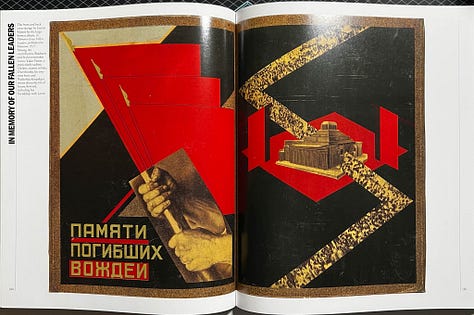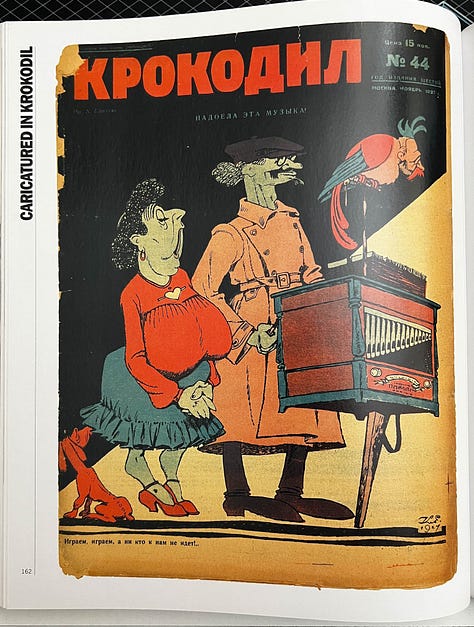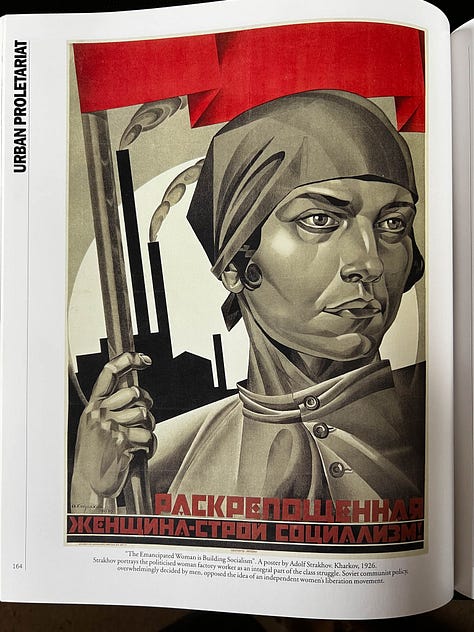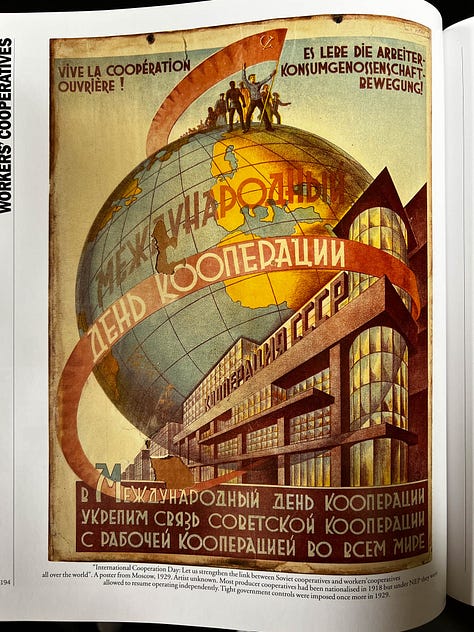April was a good reading month. I made excellent use of our newly painted decking at the front of the house and had a lovely time in the spring weather. Three of this month’s reads were audiobooks, which I listened to while painting said decking after power-washing it, along with all the fencing and the monobloc driveway. But I was having trouble taking in the books in that format. That hasn’t happened to me before. Maybe it was the nature of the work I was doing, a kind of work that I very rarely—if ever!—had found myself doing. I had the same problem last month with Silver on the Tree while doing similar jobs. I went back to that book afterwards and read a physical copy.
Books mentioned:
The Priory of the Orange Tree — Samantha Shannon
The Handmaid’s Tale — Margaret Atwood
We — Yevgeniy Zamyatin
Red Star over Russia — David King
A Disaffection — James Kelman
The Drawing of the Three — Stephen King
😍Loved
📖 Red Star over Russia, David King, 2009
Non-fiction, Physical Book, Reread
Readers of my Substack will know that I’m a Russian / Soviet history buff, so this amazing book of Soviet photos and artwork was right up my street. It follows the history of the USSR from the 1917 revolutions through to the death of Stalin in 1953 in pictures. David King’s archive must be immense and the curation process must’ve been challenging. He did a fantastic job!
The most harrowing bits were the mugshots of those executed during the show trials, page after page of portrait photos with descriptions of who they were, the date of their trial and their execution. And then there were the images of the Nazi atrocities perpetrated in Belarus during the Great Patriotic War, something I learned about just last month when I watched the horrific war film Come and See. One scene in particular from that movie was backed up by an actual photo. I won’t say what it was or show it, but it was chilling.
I loved seeing all the artwork for the Soviet propaganda posters. I can imagine that
would get a lot out of this book as inspiration for his own art.








And that last image there is the last ever taken of Stalin’s wife, Nadezhda Alliluyeva, “Citizen, you should not do that,"she told the newsman. She is seen leaving the Industrial Academy in Moscow where she had enrolled as a student in textile manufacturing to escape her depressing marriage and the claustrophobic world of motherhood to Svetlana and Vasilii in the Kremlin.
📖 A Disaffection, James Kelman, 1989
Fiction, Physical book, Reread; Nominated for Booker Prize
This was a pure mood read and I’m not quite sure what it was that put it into my head. I first read this when I was a student in Odessa, Ukraine in 1995/96. I read a LOT that year, making excellent use of the British Council Library in the city. I hadn’t heard of this author before and must’ve just picked it up while browsing.
It’s a slice of social realism of Glasgow in the late 80s and follows a disaffected school teacher, aged 29. It all takes place over a few days and is written in the Glasgow dialect. The main character Patrick is of working-class roots and is the first in his family to attempt to climb out of that class by getting a university degree and becoming a teacher. So basically me. At the time I first read this, I was midway through my MA (Hons) and was working abroad as a teacher. I remember turning up for my first day at St Andrews with a massive working-class chip on my shoulder after leaving the forces.
There’s a scene in the book where Patrick goes round to his big brother Gavin’s and gets a massive cairry oot to join in an aw-day bevvy session. So that’s an all-day drinking session with a massive carry out from the off-licence, or offy. It took me right back to my late teens / early twenties when that was a regular occurrence for this here correspondent. The way that Kelman was able to evoke those feelings was genius and I was reminded of just how grateful I am to have kicked the bevvy in 2005.
Reading the novel in my 50s with all that social-climbing and alcoholism behind me was more of a trip down memory lane than it was when I first read this. Back then I could’ve been the main character. But isn’t every reread different? That’s one of the things that makes books so wonderful. War and Peace wasn’t the same book when I read it last year, nor was Crime and Punishment. That said, those two novels are universal classics. A Disaffection is perhaps not universal, especially given that it’s written in dialect. For me though, it’s a strong contender for book of the year and it has my finger hovering over the buy button to add more Kelman to my library.
📖 The Drawing of the Three: The Dark Tower II, Stephen King, 1987
Fiction, Physical Book, Audiobook (Narr. Frank Muller), Reread
The Dark Tower series is partly responsible for my entry into the online bookspace. I first read it in the early 2010s and had a notion to read it again after finding the Kingslingers podcast and binging the episodes on The Gunslinger. That led to my buying the complete set second-hand and making the first video for my book channel.
My recent audiobook slump, where I was missing big chunks of story, made me look for something easy to listen to that I’d already read. So I chose The Drawing of the Three and it worked! I had such a good time with this book. I did tandem read some of it with the physical book in my hands, but most of it was consumed as audio, narrated brilliantly by Frank Muller.
I’ve been a fan of Stephen King’s as long as I can remember. His character work is second to none and this book is a good example of that. It starts off directly where The Gunslinger left off and moves the plot forward not one jot—this second book in the series is all about bringing in the characters that are so important for the plot. We get world-hopping and time-hopping—there are other worlds than these—and some excellent scenes with Roland travelling around in New York in different times, trying to make sense of the world. This scene here stood out to me as an example of our lack of gratitude for the miracles we take for granted every day. Roland has just gone into a pharmacy in New York City:
Here he was in a world which struck him dumb with fresh wonders seemingly at every step, a world where carriages flew through the air and paper seemed as cheap as sand. And the newest wonder was simply that for these people, wonder had run out: here, in a place of miracles, he saw only dull faces and plodding bodies.
👍🏻👍🏻Liked a Lot
📖 The Handmaid’s Tale, Margaret Atwood, 1985
Non-fiction, Audiobook (Narr. Elisabeth Moss)
Of course I knew of this novel and TV show, but had avoided it for some reason that I can’t really say. The new season of the TV show was getting some press and my wife fancied giving it a go, so we did. And wow! What a show! So, naturally I had to read the book right away. And while I enjoyed the book, it was another instance of audiobook non-stickiness. That wasn’t such a problem because I knew the story and characters from the show, but I really would like to get a physical copy and read this properly. I know it’s an excellent book and I will return to it.
👍🏻Liked
📖 We, Yevgeniy Zamyatin, (Tr., Bela Shayevich), 1924
Fiction, Physical Book, Audiobook (Narr. Toby Jones)
Again with the audiobook non-stick issue. Shayevich’s translation was smooth. I’d come across her translation work before with the excellent Second-hand Time by Svetlana Alexievich. Toby Jones’ narration was also excellent, so after finishing the book I read a few reviews and watched a few video reviews then went back to the start of the audiobook and listened again. Now that I’m thinking back, I’m wondering whether I ought to move this up to Loved and Handmaid down to Liked. Hmmm. It’s all so subjective. In case you don’t know, this book influenced Margaret Atwood and George Orwell. I suppose it’s the prototypical dystopian novel. It was written by a Russian writer during the Soviet period (1920), so you might say he knew the topic well. It wasn’t published in Russia until 1988, a similar situation to that of Bulgakov’s Master and Margarita (written between 1928–1940 and not published in Russia until 1966–67).
Again, this is a book that I will come back to. It was a nice, easy read in this translation, and boy does it make you think. I was tickled when I opened it to find an foreword by Atwood. They make a great pair of books to read back-to-back and I’m glad I did that.
😐Meh
📖 The Priory of the Orange Tree, Samantha Shannon, 2019
Fiction, Physical Book, Audiobook (Narr. Liyah Summers)
I like a good fantasy book. Add dragons and I’m there. So why was this just a meh? I struggled at first with all the names and relationships. There was just too many. But I had the same problem with Game of Thrones and I persevered with that and fell in love with the series. I don’t know what it was, but this book just didn’t do it for me. I won’t be reading the prequel.
Fiction
The Drawing of the Three
A Disaffection
We
The Handmaid’s Tale
The Priory of the Orange Tree
Non-fiction
Red Star over Russia
May Reading
Gilgamesh, Emily H. Wilson
Oblomov, Ivan Goncharov
I’m leading a group read of this novel through May and June. Join here for free.
ADHD 2.0, Edward M. Hallowell and John J. Ratey
This is a Kindle read that I try to open when I’m in the throne room instead of doom-scrolling, but so far I’m not doing so well with that.
The Iliad, Homer
Reading with Matthew Long
Anna Karenina, Tolstoy
Reading with Henry Eliot
The Karamazov Brothers, Dostoyevsky
Reading with Dana • Dostoevsky Bookclub
Stephen R. Donaldson and the Modern Epic Vision, Christine Barkley














I read We last year and loved it! I definitely recommend reading a physical copy because there were so many pages that I lingered over just to savor the writing, and you can’t do that with an audiobook.
Very interesting reading. I envy you for finding the possibility to listen to audiobooks. My husband does the same. I can't. I have to hold a physical book in my hands. I must find that book of Soviet slogans and pictures of Soviet life. It sounds incredible in your writing. Yes, I agree, Zamiatin is a very interesting writer and a precursor of Bulgakov. Thank you.